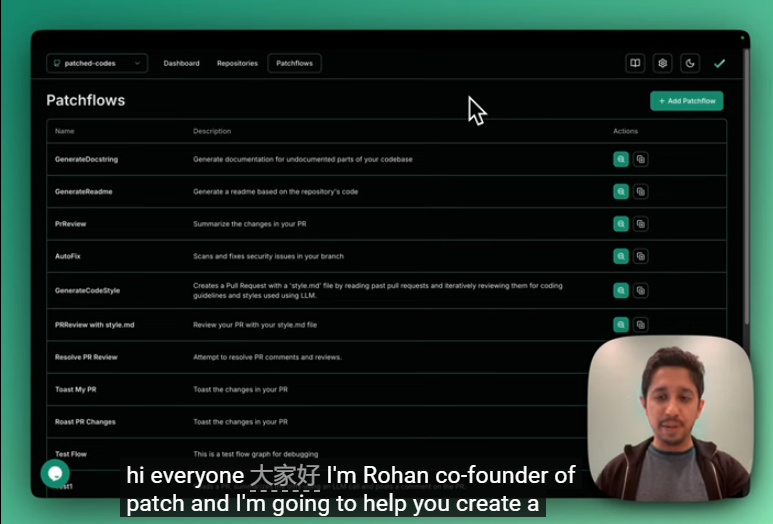If you're a developer, you must be头疼 by the tedious tasks like code review and documentation generation, right? Don't worry, Patched, a company just established in 2023, is set to bring revolutionary changes to you!
While tools for automated programming and software development, such as Anthropic Claude, Cursor, Zed, Microsoft Copilot, and Replit Agents, are emerging endlessly, there are few tools dedicated to post-code generation processing. This is precisely the gap that Patched, a startup backed by Y Combinator, aims to fill.
Founded in 2023 by Asankhaya Sharma and Rohan Sood, Patched is an open-source AI framework that automates repetitive tasks such as code review, documentation generation, and patch creation. Additionally, it can independently handle maintenance tasks like vulnerability fixes and code formatting without requiring active developer involvement.

Product Entry: https://www.patched.codes/
Patched also allows developers to create custom workflows that align with their specific needs and preferences.
Founder Sharma said: "Our goal is not to replace IDEs but to automate the tasks that IDEs are not good at." This means that Patched focuses on the processes after code submission, helping you automate repetitive and time-consuming tasks in the CI/CD pipeline.
Moreover, Patched is an "indifferent" framework, allowing you to use any large language model (LLM) you prefer, whether it's OpenAI, Google Gemini, or your own local model.
Business Model Analysis
But wait, that's not all!
Patched also offers an application with a drag-and-drop workflow builder, enabling you to create custom workflows as easily as playing with building blocks, without writing a single line of Python code.
In terms of the business model, Patched adopts a very human-centric strategy: each workflow is priced at $99, rather than charging per developer. This pricing strategy makes it more accessible for more developers to enjoy the convenience brought by Patched.
Additionally, Sharma mentioned that they created a benchmark last year to evaluate the performance of different cutting-edge models in vulnerability fixes, known as the Static Analysis Evaluation.
He explained that for other tasks that may not be so easily quantifiable, such as pull request reviews or documentation generation, they look at other metrics, such as Round-Trip Correctness Evaluation (RTC Eval), which involves running the model several times to ensure consistent results that do not change over time.
Patched's Growing Customer Base
Patched's customers are spread across the globe, such as KairosWealth in Singapore, who use Patched to ensure developers follow specific code submission guidelines. Another customer, Stack Auth, an open-source cloud key and authentication service provider, uses Patched to generate SDK documentation, improving work efficiency.
Sharma stated that it was initially difficult to convince consumers that LLMs were effective in detecting code vulnerabilities. He explained that 80% of the vulnerabilities people encounter daily are not particularly unique; they are usually repetitive mistakes that people often make.
Sharma said that in the near future, they will add a new feature to the application that allows users to save all pull requests and responses to curate their own datasets, which can later be fine-tuned for better results.
Furthermore, the company is closely collaborating with OpenAI, and Sharma said that without the support of Y Combinator, this would not have been possible.
He revealed that GPT-5 is coming, and OpenAI personnel, including CEO Sam Altman, have advised them to ensure their product remains relevant upon the release of GPT-5 and integrates the next-generation model in a way that simplifies tasks.
**Key Points:**
- 🚀 **Powerful Automation:** Patched automates tasks like code review and documentation generation through AI, freeing developers' hands.
- 🔄 **Flexible Customization:** Users can customize workflows according to their needs, supporting multiple large language models for flexible use.
- 💰 **High Cost-Effectiveness:** Unique pricing model, not charging per developer, lowers the entry barrier and encourages more developers to join.









